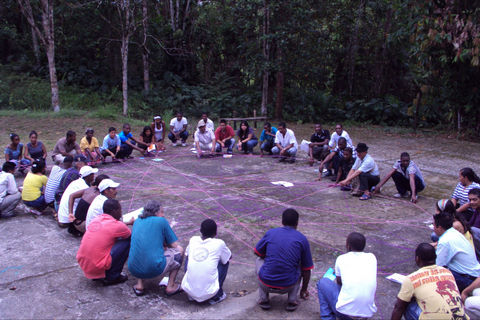With USIP support, the Jenzera Foundation for Alternative Development carried out a training project designed to build conflict resolution capacity and encourage inter-ethnic cooperation in a number of rivers in Colombia’s Pacific coast.
The first project trained about 40 people from the San Juan and Naya River Basins, and the second project is including about 40 people from the Yurumanguí, Cajambre, Mayorquín, Anchicayá, Raposo and Bajo Calima rivers, and from Bahía Málaga, la Meseta, La Barra, and Karmata Rúa. Participants represent Eperara Siapidaara, Embera Chamí, Wounaan, and Nasa Indian communities, as well as Afro-Colombian and mestizo peasants. For the first set of trainings, Jenzera developed curricular materials on conflict management, the rule of law, inter-ethnic relations, and economic rights with Afrocolombian, indigenous, and peasant leaders in the Naya and San Juan rivers, and conducted six five-day training workshops in 2007 and 2008 with community leaders. Additionally, it organized guided visits for community leaders to other regions of Colombia that have developed effective peacebuilding programs, and devised communication strategies aimed at local, national and international audiences to prevent further massacres in Naya and shape a peace agenda. The project attempts to empower local organizations to work together to peacefully resist armed conflict, manage interethnic relations in the region, and preserve the rights of the marginalized and impoverished population. The trainings hope to increase local negotiation capacities so that communities can confront challenges, including armed blockades and rapid economic change as a result of the increase of the illegal coca economy, and some participants have successfully run for elected office.
Background
Guerillas, paramilitaries, and other illegal armed actors control much of Colombia's Pacific coastal region. These armed actors have brought the illicit coca economy to the Pacific region, further weakened already frail institutions, and disrupted local economies. The Naya River basin—home to a number of indigenous, black and peasant communities—is plagued with incursions by these armed groups and displacement of its residents, as well as violence related to arms and drug trafficking. Naya’s mineral resources, woodlands, and mangroves are also attracting extractive industries that residents fear will exploit the region’s resources without investing in sustainable development that benefits the region. In response, local populations have sought to design strategies to resist the impacts of violence and to find economic alternatives to coca plantations and extractive economic plans.
Activities
Jenzera, with the support of USIP, is now facilitating a training program for 36 Afrocolombian, indigenous, and mestizo community council leaders in Colombia's Pacific region. The project builds on a successful previous initiative that was funded by USIP, and will:
- Train 36 leaders from six other river basins in conflict resolution skills and concepts
- Develop a new training curriculum that will include modules on sociopolitical history, public policy, political organization, territory, and conflict resolution
- Facilitate an educational exchange between these trainees and members of an indigenous reservation in northern Colombia to share conflict resolution strategies
- Organize bimonthly gatherings of experts in Bogota to analyze current events in Colombia and their effects on the Pacific coast
- Build capacity among local leaders that will help them analyze local and regional dynamics and legislation pertaining to ethnic communities
- Strengthen local organizations
- Build friendship and trust between participants of different ethnic groups
- Prepare participants to promote conflict resolution strategies within and between their communities.
As of April 2011, Jenzera has held two of the six training modules. There has been tremendous demand from local leaders wishing to participate in the project, and Jenzera has unfortunately not been able to accommodate all of the prospective participants. In spite of this, the project continues largely as planned, and the project participants are taking steps to transfer what they learn in the training modules back to their home communities.


